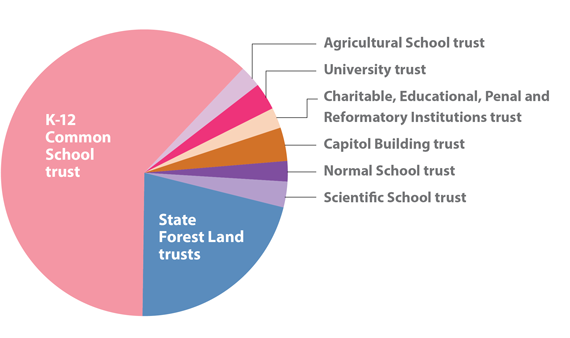Funding Schools and Services
Trust Lands Support Schools and County Services
What are state trust lands?
The Department of Natural Resources manages 3 million acres of state trust lands in Washington. State trust lands are distinctive in that they are managed to produce non-tax revenue for specific beneficiaries.
Just before Washington became a state in 1889, Congress passed the Omnibus Enabling Act of 1889, which granted the new state millions of acres of land to support public institutions. Today, these trust lands are an ongoing source of land-based financial support to the various beneficiaries, including public kindergarten through Grade 12 (K-12) schools, state universities, buildings on the capitol campus, and correctional facilities. By far the largest of these federally granted trusts is the Common School trust with approximately 1.8 million acres of forestland, agricultural lands and other properties. Revenue generated on these lands helps fund K-12 school construction projects across the state.
State Forest trust lands are another category of state trust lands managed by the department. Most State Forest trust lands were originally privately owned forest lands forfeited to counties in the 1920s and 1930s due to unpaid property taxes. These lands were subsequently turned over to the state and today DNR manages State Forest trust lands for the benefit of the county where the lands are located. Most State Forest trust lands are in western Washington.
Who are the beneficiaries?
DNR manages several trusts with different beneficiaries. The chart below illustrates the proportional acreage of the major trusts, followed by a description of the beneficiaries for each.
Major Trusts Managed by DNR, by Acreage

K-12 Common School trust: These trust lands benefit K-12 schools by provide funding for school construction projects throughout the state.
State Forest Land trust: State Forest trust lands (Transfer and Purchase) benefit counties and junior taxing districts. They provide revenue that supports local and state schools as well as county services including roads, libraries, fire districts, ports, hospitals and emergency management.
Scientific School trust: These lands benefit Washington State University.
Agricultural School trust: These lands provide funding for Washington State University.
Normal School trust: These lands generate revenue for Eastern Washington, Western Washington and Central Washington universities, and The Evergreen State College.
Capitol Building trust: These lands produce funding for the state buildings at the Capitol in Olympia.
Charitable, Educational, Penal and Reformatory Institutions trust: These lands support institutions managed by the state departments of Corrections and Social and Health Services.
University trust: These lands produce revenue for the University of Washington.


